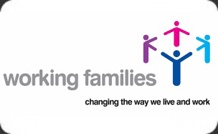Flexi-working is becoming the new ‘nine-to-five’
29th August 2014
With a new law in force from June allowing any employee to ask for flexible working arrangements, Jane Nyhan of Chwarae Teg argues that time is starting to run out for the standard ‘nine-to-five’ job.
 From June, all workers will have the right to ask their bosses if they can move to a working pattern that differs from the traditional seven or eight-hours a day, five days a week, in the office, shop or factory.
From June, all workers will have the right to ask their bosses if they can move to a working pattern that differs from the traditional seven or eight-hours a day, five days a week, in the office, shop or factory.
No longer must workers have specific caring responsibilities before they’re allowed to request flexible working. They’re now entitled to apply, irrespective of the reason.
They are at liberty to ask for part-time working, flexi-time, a compressed week, annualised hours, a job share or remote or home-based working, or indeed any one of half a dozen other structures which fit in with the way individuals want to live their lives outside paid employment.
Bosses are not legally obliged to accept but, if they refuse, they must give a reasonable explanation and show how the change would be bad for business.
As the new law comes into force, some voices have warned of chaos, unbridled bureaucracy or even industrial strife, claiming that the unrestricted right to ask for flexible work patterns could lead to confusion, resentment and a forest of red tape.
According to these arguments, if everybody started demanding less rigid working structures, businesses would simply become unmanageable with no one being available when they’re actually needed.
Experience, however, paints a very different picture. Among best practice employers, the universal ‘right to request’ has been in place voluntarily for several years now. These farsighted bosses already assess such applications purely on the basis of whether the pattern required will work for the business, rather than on whether the individual concerned is a ‘deserving case.’
Allowing everyone to apply will, nevertheless, make a significant difference to the way the whole issue is approached. In fact it could become a major game-changer in workplace relationships, as employers themselves start to view agile arrangements as a potentially valuable business tool that could expand their customer base, boost output and broaden their talent pool.
Rather than seeing it merely as a concession to help particular staff meet their family obligations, they can now feel freer to work with their team to use versatile employment patterns in a proactive and strategic way that suits the needs and ambitions of the business.
For example they could see it as something to help them reduce office costs as more people work remotely or to extend the hours they can be available to customers without increasing operating costs.
When Monmouthshire County Council opened its new offices at Usk last year it deliberately provided only 88 ‘hot desks’ for 200 staff but at the same time issued all employees with wi-fi enabled laptops so they could work effectively at different times and locations.
Some argue that those employees who want different working patterns already have them, and there is little further appetite to depart from the comfortable and predictable working day and week.
Not so, according to a recent ICM poll which found that, while 12 million workers in Britain already have flexible arrangements with their employers, a further 8.7 million would like to work in this way if they had the chance.
That represents a very significant opportunity for entrepreneurs or managers who want to give their firms a new agility that sharpens their competitive edge.
Our own research at Chwarae Teg shows that 71% of Welsh employers actually regard flexible working as good for business and the Chartered Institute of Personnel and Development has estimated that flexible working makes individual employees 39% more productive.
It’s widely accepted that these uplifts in productivity come from improved commitment, focus and motivation among individuals at work, in addition to reduced absenteeism and the ability of firms to attract better talent through progressive employment practices.
But it goes beyond that. The advent of the universal right to request flexible working coincides with the arrival of a new generation of workers with new expectations and new ways of using technology.
This is a generation less in tune with traditional command and control management and more responsive to the 21st century idea of management based on results achieved rather than hours spent in a particular room. They are also more at home with the versatile use of technology. Delivering a piece of work via their smart phone is not necessarily alien to them.
Some inevitably argue that it is much harder to manage workplaces if people are not at particular places at particular times. But those employers who have cultivated a mature relationship with their staff and created the environment in which workers take responsibility for their own performance are reaping the benefits through improved output. Modern workers know what they are expected to deliver and the vast majority just want to get on with the job of delivering it.
The new legislation provides a golden opportunity for more employers to adopt this approach to managing their people.
Agile workplaces can also help businesses find new opportunities. For example one optician has negotiated variable hours with its staff to allow them extend or reduce opening hours according to expected demand. In their case, this has resulted in closing on Saturday afternoons but opening later in the evenings, particularly during term time when parents struggle to get their children to the shop for eye tests.
In many cases shift-swapping and self-rostering arrangements empower staff to work together to ensure the needs of the organisation are met while, at the same time, giving them the flexibility to arrange their private lives without undue restrictions. I believe the new legislation will encourage more of this.
Working practices have evolved over the years and both employers and their workers have simply absorbed the change and made it work. At one time for instance the idea of personalised annual leave seemed anarchic, but now it’s the norm right across the service sector and even through large swathes of manufacturing industry as staff cover for each other and businesses carry on without interruption.
Society keeps on changing, and people now have different expectations from both life and work. Agile businesses that can turn that to their advantage.
Jane Nyhan is specialist adviser on modern working practices at Chwarae Teg, the body which ‘works to develop a Wales in which women can achieve and prosper.’

- Help us influence government, industry and academia
- Help us keep gender on the agenda
- Have your views taken into account
![]()
Did you Know?
"Companies with 30% women in senior positions are more likely to have a culture where all women thrive"
- London Business School
















